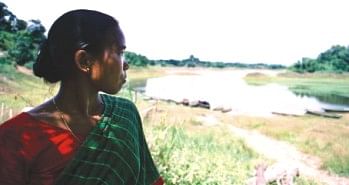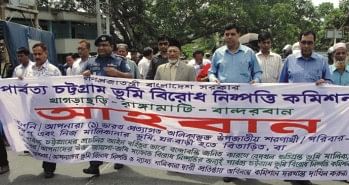|
Human Rights
Brewing Discontent
Land Commission Act needs major mendments to make everyone in the Chittagong Hill Tracts happy
SHANTIMOY CHAKMA, from Rangamati
 |
| Photo: Zahedul i khan |
Some decisions of the Chittagong Hill Tracts (CHT) Land Disputes Resolution Commission (CHTLDRC) have given birth to major resentments among the indigenous people of the area. One of the allegations against the commission is that its chief is making decision unilaterally, as a result of which hardly anyone has responded positively to the commission's call for application to settle scores on disputed lands.
To make matters worse for the beleaguered CHTLDRC, besides its Chairman and Secretary, no one else of the five-member body attends its meetings, threatening to make the all-important land dispute resolution committee dysfunctional. So far, one commission meeting and nine administrative meetings of the body have taken place, which has left many wondering whether the commission will actually be able to deal with the core issue of bringing peace to the CHT-- deciding the fate of the disputed land.
Justice Khademul Islam Chowdhury, the chief of the commission, has called one administrative meeting after the other, instead of calling exclusive meetings only with the members of the commission. The body has four other members: Chairman of CHT Regional Council, additional divisional commissioner of Chittagong, the concerned Circle Chief and a chairman of the concerned Hill District Councils. Of these members, only Santu Larma, Chairman of CHT Regional Council, attended a meeting held on January 27 this year in Khagrachhari.
On June 11 this year, an application with a bunch of recommendations by the three circle chiefs – Chakma, Bomang and Mong Circles--was sent to the commission chief, urging him to play his due role in the ongoing impasse. Justice Khadem's activities have also drawn flack from the Parbattya Chattagram Jana Sanghati Samity (PCJSS), which has demanded the postponement of the commission's activities.
 |
| A rally in Rangamati as part of the Land Commission's awareness campaign. |
Many also allege that the LC chief unilaterally makes decision without informing its members, violating the provisions of the peace accord. Presently all the LC does now is campaign about its functions for an awareness programme among the hill people. On May 13 a rally and a meeting were held in Rangamati as part of an ongoing campaign, but only the Upazila Nirbahi Officers (UNOs), some administrative staffs and journalists participated in the rally. The traditional leaders – headmen and karbaries who can play a pivotal role in solving the crisis – have remained absent every time.
The commission's secretary Abdul Hamid on March 16 circulated a public notice giving a deadline of 60 days to submit applications from the affected people on the disputed lands. However, a new time frame of 90 days was declared as the previous deadline expired on May 15. The new deadline was announced because the previous one failed to garner any enthusiasm in the indigenous community. So far a total of 3,933 applications – 769 in Rangamati, 325 in Bandarban and 2,839 in Khagrachhari – have been submitted to the commission. Sources have mentioned that two third applicants are the Bengali settlers. Md. Abdul Hamid has said that the present deadline will expire on October 21.
According to the commission, there are a total of 12,225 repatriated jummo refugees who returned from India in the CHT. Eighty thousand leaflets and 15,000 posters were distributed in the three hill districts so far as part of the campaign. According to different sources, the government recently allotted only Tk 2 lakh to the LC for the campaign work.
The new LC office was set up on March 14 this year in Khagrachhari with 14 staff members, including its chairman. But no sub-offices were set up in Rangamati and Bandarban. “I along with the chairman have sent a letter to the Land Ministry last January urging it to set up sub-offices in Rangamati and Bandarban. But the proposal has not yet been accepted,” Abdul Hamid says.
He points out that the government grant of Tk 2 lakh for the ongoing awareness campaign is enough. Hamid also believes that there is no scope for the politicisation of the body as it is a law commission in its nature. “I called many meetings, but PCJSS chief Santu did not attend any of these,” he says.
Chief of Chakma Circle barrister Raja Devashis Roy thinks that the issue is a critical one and without a detailed discussion at the commission meeting, the LC shouldn't have circulated public notice.
“As far as I recall, in the last commission's meeting held on January 27 in Khagrachhari, no such decision has been taken about circulation of public notice or carrying out 'cadastral survey',” Devashis says.
He thinks that the decision must be taken at an 'exclusive meeting' before circulating any kind of public notice and timeframe.
“These are some deficiencies in the commission act which I think should be fixed immediately. I have urged the Prime Minister and some other ministers several times about the matter,” he says.
“If the commission works with the plain land concept in the hills then it will be completely wrong. Land disputes can be resolved in the region by following the existing rules and regulations,” Devashis says.
Chief of Mong Circle Saching Prue Chowdhury says there are some contradictory sections in the act, which was passed in the Jatiya Sangsad in 2001. “I think we can start the activities of the Land Commission after bringing amendment to these laws,” he says.
Copyright
(R) thedailystar.net 2010 |
